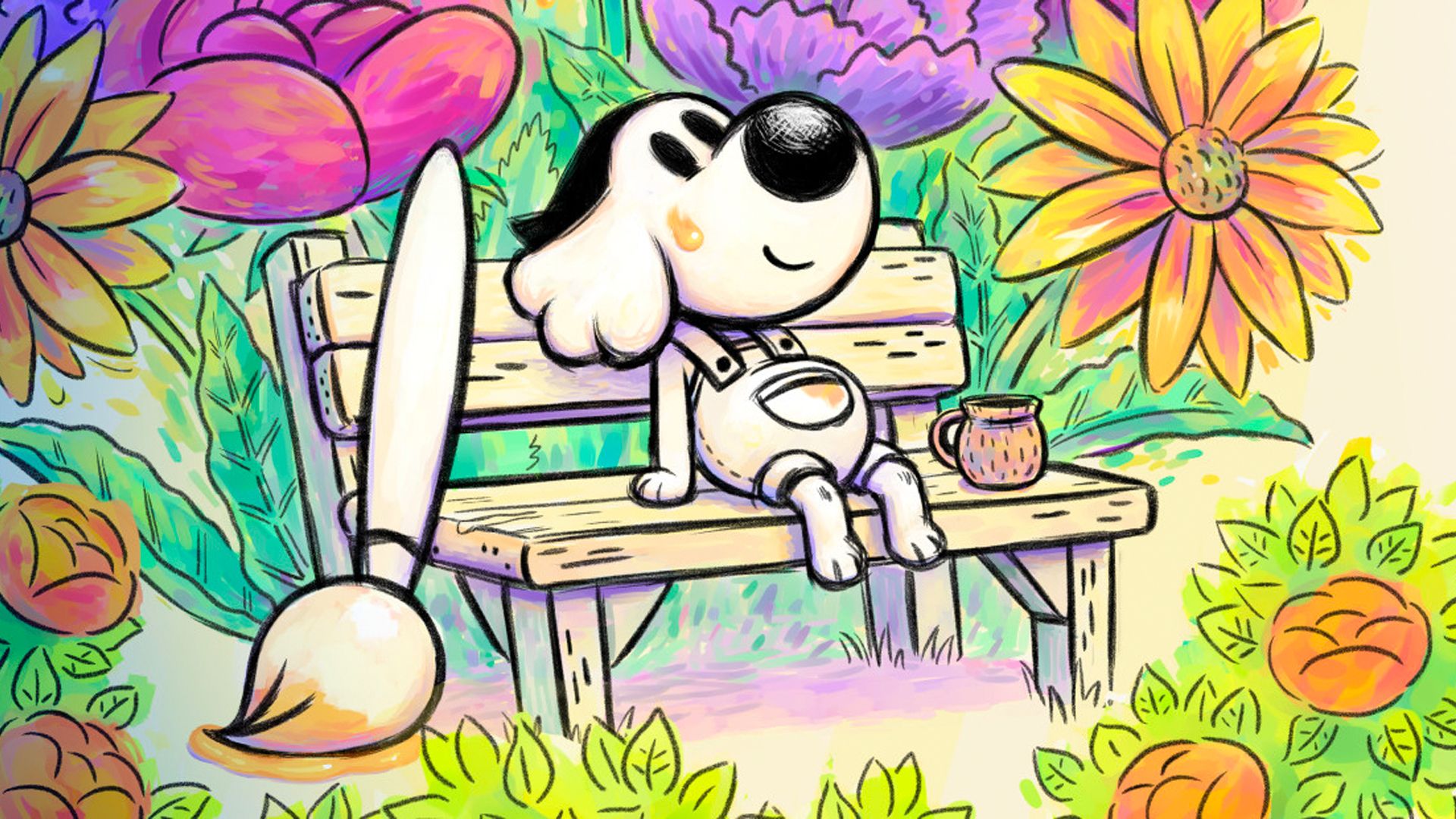Chicory: A Colorful Tale Review
A recognition of creative minds afflicted by imposter syndrome

This game was reviewed using a code provided by Finji.
There is an inherent noteworthiness to a game that is granted when it takes a stand and speaks about social issues. Games that forego aimless entertainment to make a difference can seem pretentious, but when done right, these treasures can connect to those who relate to their themes. Chicory: A Colorful Tale is a game that does just that, harboring a purposeful story through the synthesis of deeply personal characters, clever painting mechanics, and commentary on societal expectations.
Chicory spoke to me on a personal level. For all of its witty, cute characters, I felt the deepest connection with the protagonist herself, who constantly struggled with the feeling of being in a position they didn’t deserve.
You begin your adventure within the Picnic Province (the food-themed setting of Chicory) as the protagonist goes through the motions at their janitorial job within the Wielder’s Tower. Wielders come from a long line of artists who wield the legendary paintbrush: a magical tool gifting the user the ability to color the world.
Chicory, the current Wielder, offers the protagonist the brush after giving up on their job. This immediately places Mac&Cheese* (the name of my protagonist) in a situation they’re clearly not trained for.
*To embrace the meal themed setting, Chicory asks you for your favorite food. Your answer will become the name for your character, hence the beginning of Mac&Cheese.
The paintbrush bridges almost every interaction between the player and the world, so the painting mechanic is of utmost importance.
Fortunately, Chicory: A Colorful Tale has an abundance of different puzzling mechanics, all tying into the painting that you can do. The game enhances these painting mechanics thanks to unique patterns you can apply to your brush. This makes painting the world an enjoyable venture!
Since the entire map can be colored, Chicory plays like an adventure game blended with a coloring book that comes to life before your eyes.
The beautiful musical score amplifies the theme of a whimsical storybook within Chicory. Musical tracks by Lena Raine that accompany gameplay create an immersive storybook atmosphere, pulling you into cheerful (or intimidating) locations.
Whether you’re painting a line for the bug platform you’re standing on to follow or you’re lighting a room up with glow paint, Chicory doesn’t fail in its romance of gameplay mechanics and puzzling.
As you’re constantly strengthening your bond with the brush, you’ll unlock new abilities that bring down barriers to new regions of the map where you can find more puzzles and collectibles. This clear Metroidvania subgenre inspiration creates a world you want to see more of. Chicory’s exploration and painting go hand-in-hand, making exploration rewarding, stimulating, and fun.
Like any great adventure title, Chicory successfully fills the Picnic Province with likable characters. The game is full of humanized animals brimming with humorous and intelligent dialogue. These characters will ask you to paint for them. By asking the player to perform tasks of painting and decorating in their own vision, Chicory allows you to explore and attempt art with no repercussions.
It doesn’t matter if you’re downright awful at painting, as Chicory doesn’t want you to feel like you’re a successful artist — it wants you to try.
You could spend hours detailing a portrait of an animal or scribbling a few lines onto the canvas. As long as you’re painting, Chicory rewards you. All of your creations and leftover ink decorate the Picnic Province, so returning to prior areas makes you feel as if you left your mark.
I’d argue that if you removed Chicory’s meaningful story, the gameplay alone would carry the title far beyond the standard of many AAA releases today.
Where Chicory blossoms in gameplay is also where it narratively weaves a story of a character experiencing the damning touch of imposter syndrome.
Mac&Cheese is tasked with saving the Picnic Province — an unexpected responsibility that, over time, eats away at her morale. Mac&Cheese makes it clear within her dialogue that she often doubts her own abilities. Despite having the initiative to step up and make a difference, she lacks the confidence and skills needed to be successful.
These feelings are mirrored by the current Wielder, Chicory. Blackberry, the highly expectant Wielder that existed before her, recognizes that Chicory exudes an immense amount of talent and potential. Regardless, her undeniably burdening expectations push Chicory deeper into a depression brought on by feelings of inadequacy and overbearing responsibility.
The relationship between these two characters is a beautiful waltz that aids in the player’s understanding of the feelings the two are experiencing.
Mac&Cheese’s deep level of imposter syndrome is valid and makes total sense within the context: a dreamy-eyed janitor working at a place where painting occurs is caught up in a position that isn’t about painting. Suddenly, she is promoted to a position as a painter and asked to save the world. Mac&Cheese is cast into the fray as an individual who not only can step up and make a difference but is expected to, regardless of the hardships ahead.
Personally, Mac&Cheese’s struggle with worrying more about what others think versus deciding on her own, along with her fight with imposter syndrome is deeply relatable.
Anytime I find myself in a position surrounded by talented individuals, I’ll mentally cower down and feel less-than confident. Imposter syndrome makes you feel like you’re wearing a mask, hiding your inability to succeed, even if you’re talented. Any type of content you produce will seem “not good enough”, “already done before”, or “an imitation of someone else’s success.”
It’s a feeling that makes you feel as if you don’t belong where you are. It’s a fear that others will realize you’re faking the confidence and hoping nobody notices your fragility. This game had me reflecting on these feelings.
I couldn’t help but think about my admission into my dream university and how it felt fake. I couldn’t tell if I was misreading the letter, if they mistook me for someone else, or if I just got lucky. I never felt like the lackluster work I put in could amount to a prestigious position at such an exclusive and demanding school.
This destructive mindset applies to everything in my life — even my writing here today on SUPERJUMP. With such talented writers who are constantly putting out powerful stories, jeopardizing questions plague my mind. How does my work stand up? Am I good enough? Why am I even writing?
Imposter syndrome unearths and amplifies your self-doubts, making you feel incompetent, insufficient, and no good.
Chicory: A Colorful Tale shares that the biggest catalyst of imposter syndrome is your own mind.
Often you’re fighting familiar faces in the boss battles: characters who aren’t normally enemies but take the form of them in the deepest depths of the game’s dungeons. From a demeaning and destructive Chicory to even a harsh vision of yourself, the bosses of the game remind the player that imposter syndrome largely comes from within, presenting an internal struggle.
One of the most important messages Chicory presents during the story is that you can find solace from your imposter syndrome within those who are close to you.
A scene that stands out is during Mac&Cheese’s pizza parlor lunch with her sister. They’re rudely interrupted by the man operating the store. To him, Mac&Cheese isn’t an everyday customer, but an opportunity to get an advert painted for his shop.
“Is this how you’re treated by everybody?” asks her sister, to which Mac&Cheese replies, “Yeah, pretty much.” Then, Mac&Cheese’s sister offers to help her paint, providing a design that you can color into.
This bit of help goes a long way for the protagonist and reminds her she isn’t alone, as you can find help from Mac&Cheese’s family consistently throughout the story.
The game scatters phone booths throughout the map and allows Mac&Cheese to phone home and ask her parents for advice. This “tip” system guides you to your next objective in either a vague or direct answer, dependent purely upon whether you ask mom or pop. As a gameplay mechanic, the phone booth is distinctive and enjoyable, offering accessibility that ties into the narrative and theme of Chicory.
Impactful releases like Chicory: A Colorful Tale never get the amount of recognition they deserve. The importance of a story that can speak to you by offering a striking level of transparency between the creators and the player makes a telling difference in gaming.
By effortlessly tying gameplay mechanics, thematic storytelling, world-building, and character dialogue together, Chicory: A Colorful Tale is a comforting embrace that reminds the player of their value.
It’s okay to feel lost and not know what to do next. While you’re capable of forging your own future, it’s important to take the time to ease the stress that comes with responsibility by relying on those you love.
